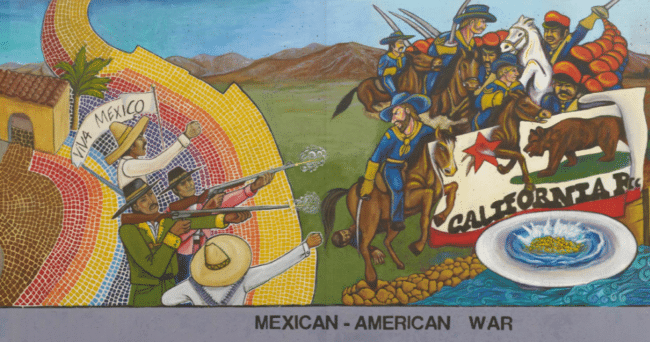
A depiction of two panels from The Great Wall of Los Angeles, a mural by Judy Baca. Source: JudyBaca.com
Today’s border with Mexico is the product of invasion and war. Grasping some of the motives for that war and some of its immediate effects begins to provide students the kind of historical context that is crucial for thinking intelligently about the line that separates the United States and Mexico. It also gives students insights into the justifications for and costs of war today.
This activity introduces students to a number of the individuals and themes they will encounter in the chapter from Howard Zinn’s A People’s History of the United States, “We Take Nothing by Conquest, Thank God.” The individual roles include:
- Cochise, Chiricahua Apache leader
- Colonel Ethan Allen Hitchcock, commander of the 3rd Infantry Regiment
- Congressman Abraham Lincoln, Whig Party, Illinois
- Doña Francesca Vallejo
- Francisco Márquez, Mexican Cadet
- Frederick Douglass
- General Mariano Vallejo
- General Stephen Kearny
- Henry David Thoreau
- Jefferson Davis, plantation owner, Mississippi
- María Josefa Martínez, Santa Fe, New Mexico
- Padre Antonio José Martínez
- President James K. Polk
- Reverend Theodore Parker
- Sgt. John Riley San Patricio Battalion, Formerly U.S. Army
- William Lloyd Garrison , Founder, American Anti-Slavery Society
- Wotoki, Miwok Indian, California.
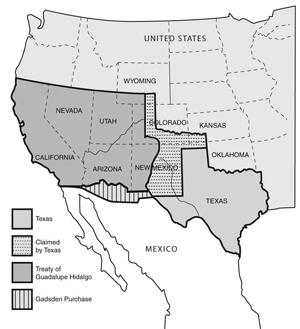
The lesson includes a reading from Zinn’s chapter, “We Take Nothing by Conquest, Thank God.” Here is an excerpt.
Frederick Douglass wrote in his Rochester newspaper the North Star, January 21, 1848, of “the present disgraceful, cruel, and iniquitous war with our sister republic. Mexico seems a doomed victim to Anglo Saxon cupidity and love of dominion.” Douglass was scornful of the unwillingness of opponents of the war to take real action (even the abolitionists kept paying their taxes):
No politician of any considerable distinction or eminence seems willing to hazard his popularity with his party . . . by an open and unqualified disapprobation of the war. None seem willing to take their stand for peace at all risks; and all seem willing that the war should be carried on, in some form or other.
Where was popular opinion? It is hard to say. After the first rush, enlistments began to dwindle. Historians of the Mexican war have talked easily about “the people” and “public opinion.” Their evidence, however, is not from “the people” but from the newspapers, claiming to be the voice of the people. The New York Herald wrote in August 1845: “The multitude cry aloud for war.” The New York Morning News said “young and ardent spirits that throng the cities . . . want but a direction to their restless energies, and their attention is already fixed on Mexico.”
It is impossible to know the extent of popular support of the war. But there is evidence that many organized workingmen opposed the war. There were demonstrations of Irish workers in New York, Boston, and Lowell against the annexation of Texas. In May, when the war against Mexico began, New York workingmen called a meeting to oppose the war, and many Irish workers came. The meeting called the war a plot by slave owners and asked for the withdrawal of American troops from disputed territory. That year, a convention of the New England Workingmen’s Association condemned the war and announced they would “not take up arms to sustain the Southern slaveholder in robbing one-fifth of our countrymen of their labor.

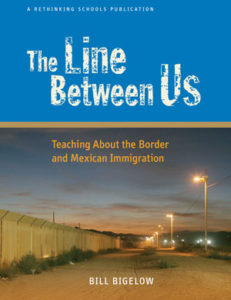 This lesson was published by Rethinking Schools in The Line Between Us: Teaching About the Border and Mexican Immigration.
This lesson was published by Rethinking Schools in The Line Between Us: Teaching About the Border and Mexican Immigration.
For more lessons like “U.S. Mexico War: “We Take Nothing by Conquest, Thank God,” order The Line Between Us with role plays, stories, poetry, improvisations, simulations and video edited by Bill Bigelow.
See Table of Contents.
Classroom Stories
As educators across the country are faced with the daunting challenge of moving their instruction online in the midst of the global pandemic, many teachers are brainstorming innovative ways to implement interactive lessons with students. Bethany Hobbs is one of those educators.
Read more to find out how Hobbs taught this lesson online during the COVID-19 pandemic.

I teach at an inner city school, an incredibly diverse school. The lesson on the Mexican American War and the role play are incredibly effective in helping students understand the role of racial bias in the history of U.S. Foreign Policy.
Students really appreciate the opportunity to read and reflect on Zinn’s chapter, and appreciate different points of view about the war during the role play. My Latino students appreciate the approach, one that all too often in their education has not received the attention it deserves. This lesson took on new forms and even greater importance at our school, with the organization of a Hispanic Union, and it informed our celebration of Hispanic Heritage Month and current events, like the debate on immigration policy.
Many of my 12th grade students today in Government class still look back to this lesson as a foundational moment in their learning about the history of US/Mexico relations. (They) see that the border issue today has a much longer history and wider context than they originally may have realized.
Today was an amazing tea ☕️ party in Latin American Studies! How should we remember the Mexican-American War? Students got to become characters from various perspectives of this event! Thank you @ZinnEdProject for the great resources! @TeaneckHigh @SpencerAndreD pic.twitter.com/kvOXE7FctU
— James E. Bermudez (@MrJBermudez) February 23, 2024
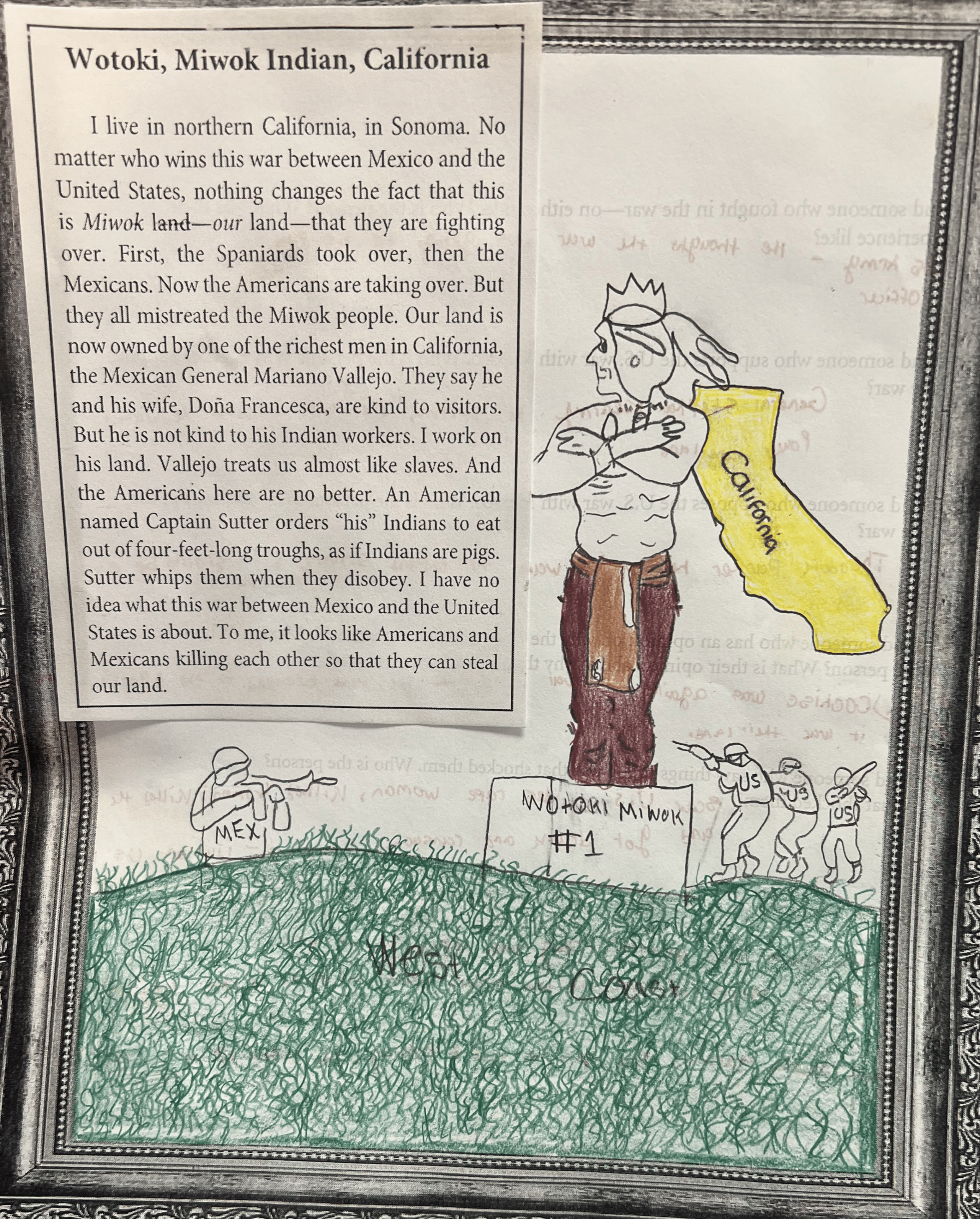
I want to personally thank the Zinn Education Project for helping me with my lesson on the Mexican-American War. The tea party we had was an absolute pleasure because of the sheer element of detail put into the lesson by the creators. Having multiple perspectives of how people reacted to the U.S. intervention in Mexico and the subsequent annexation of territories in the southern portion of the U.S. was clearly something that I missed while I was learning about this in high school.
I really loved that this lesson ultimately led us to have a great in-class discussion and it’s created an extra layer for fun, creativity, and collaboration. The fact that all of the personal perspectives were ready to go and be printed out made this a very easy lesson to incorporate into my classroom. I would 100% recommend this lesson to anybody who wants a refreshing alternative approach to teaching social studies.
The U.S. – Mexico War Tea Party lesson is without questions one of the most engaging lessons for my students all year. I have learned so much more about different perspectives on the war through teaching this lesson. My students see the complexities of the war and how it affected all parties involved, while they have the opportunity to develop their historic empathy skills when they role play the different historic figures involved. The conversations that come out of this lesson are thoughtful and relevant for today. I look forward to teaching this lesson each year, it’s a winner!
I dedicate a unit to westward expansion, and using the U.S.-Mexico War Tea Party activity has given students many perspectives on the war.
They enjoy this lesson in particular because they are able to interact with one another and teach in turn their assigned perspectives. I find that they walk away from this activity knowledgeable and excited to learn about the impact of the war.
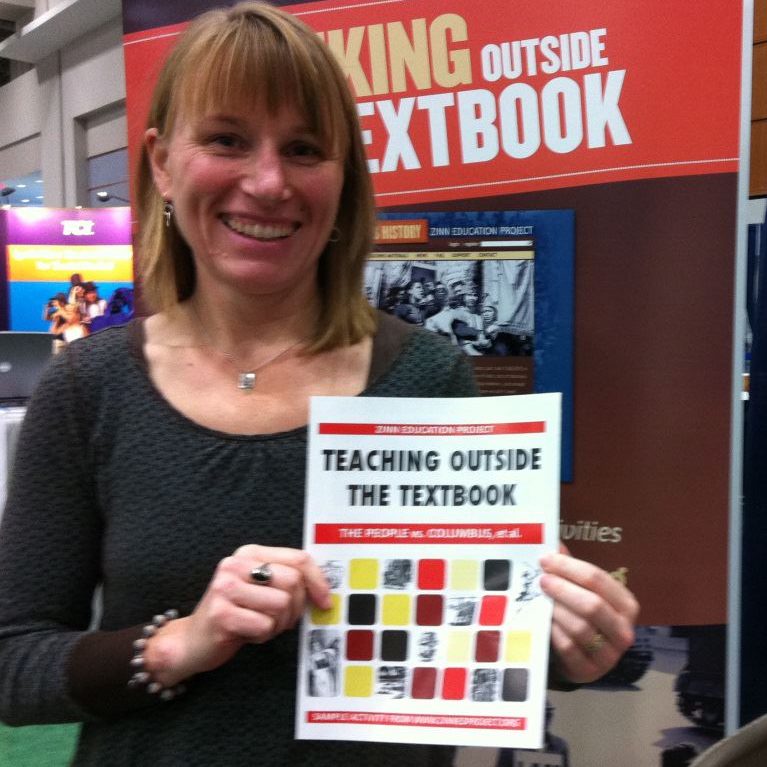
I received the Zinn Education Project materials and I immediately flipped through the book and taught the U.S. – Mexico War lesson. It was so wonderful to see a group of usually unmotivated students engaged in the lesson that I called in another teacher to see this group of students actively involved in the activity.

I use lessons from the Zinn Education Project because they are relevant, factual, and inspiring. Lessons like The U.S. – Mexico War shed light on aspects of our shared American heritage that are often overlooked. These lessons give a voice to great Americans who are too often forgotten.
Even though my students don’t quite understand it yet, I can see that a close examination of people’s history empowers my students to use their own voices.
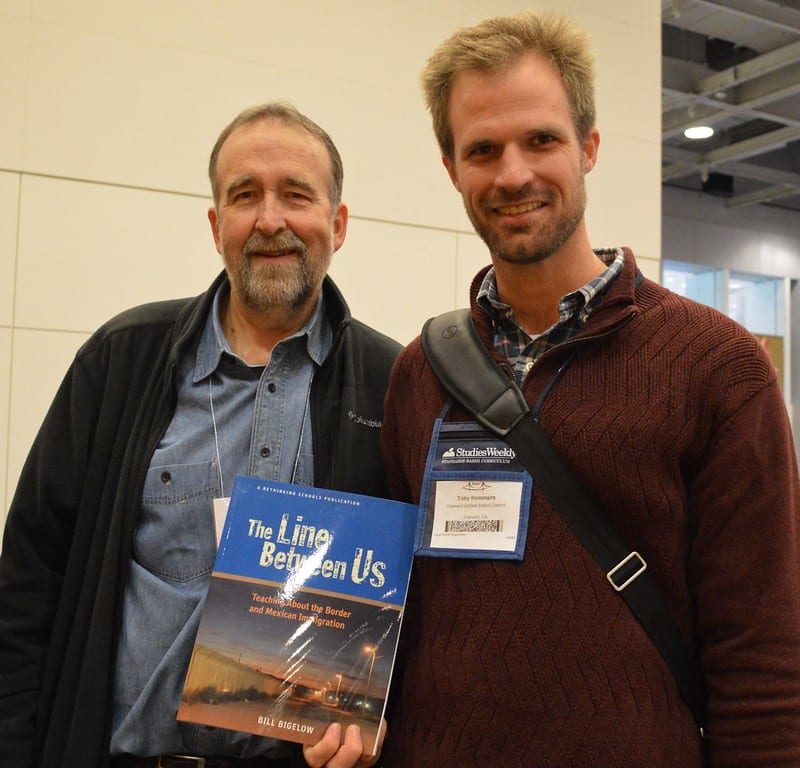
I used the US-Mexican American War lesson by Bill Bigelow of Rethinking Schools that is posted at the Zinn Education Project website. By playing one of the characters in the role play, I really enjoyed how it gave me a chance to talk to students I don’t normally get to talk to, particularly some of the quieter students.


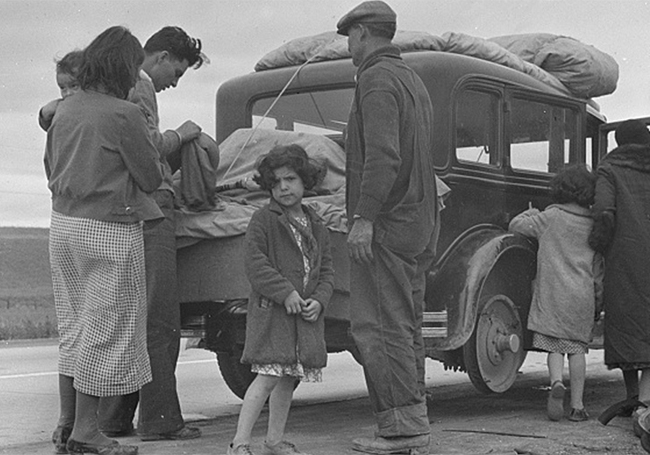
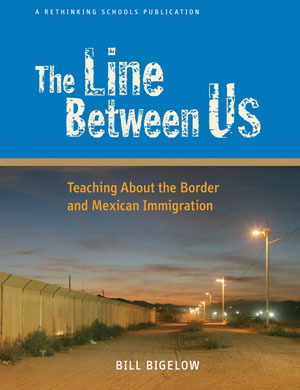
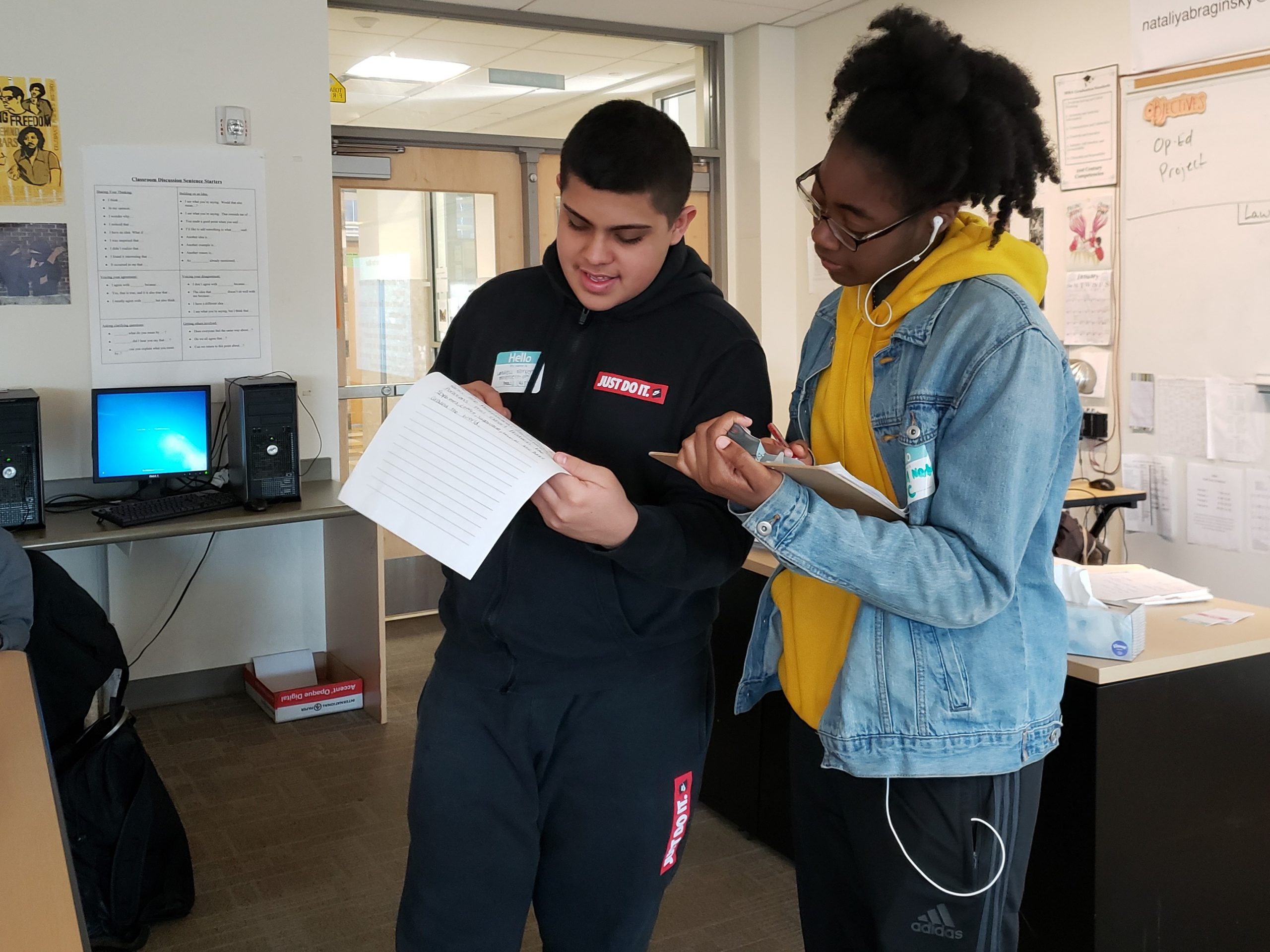
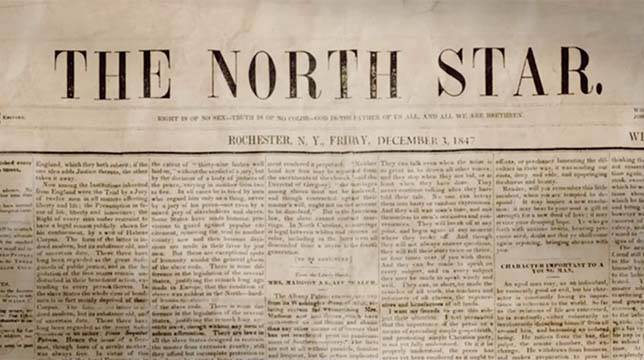
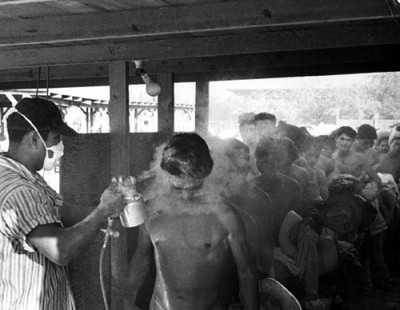
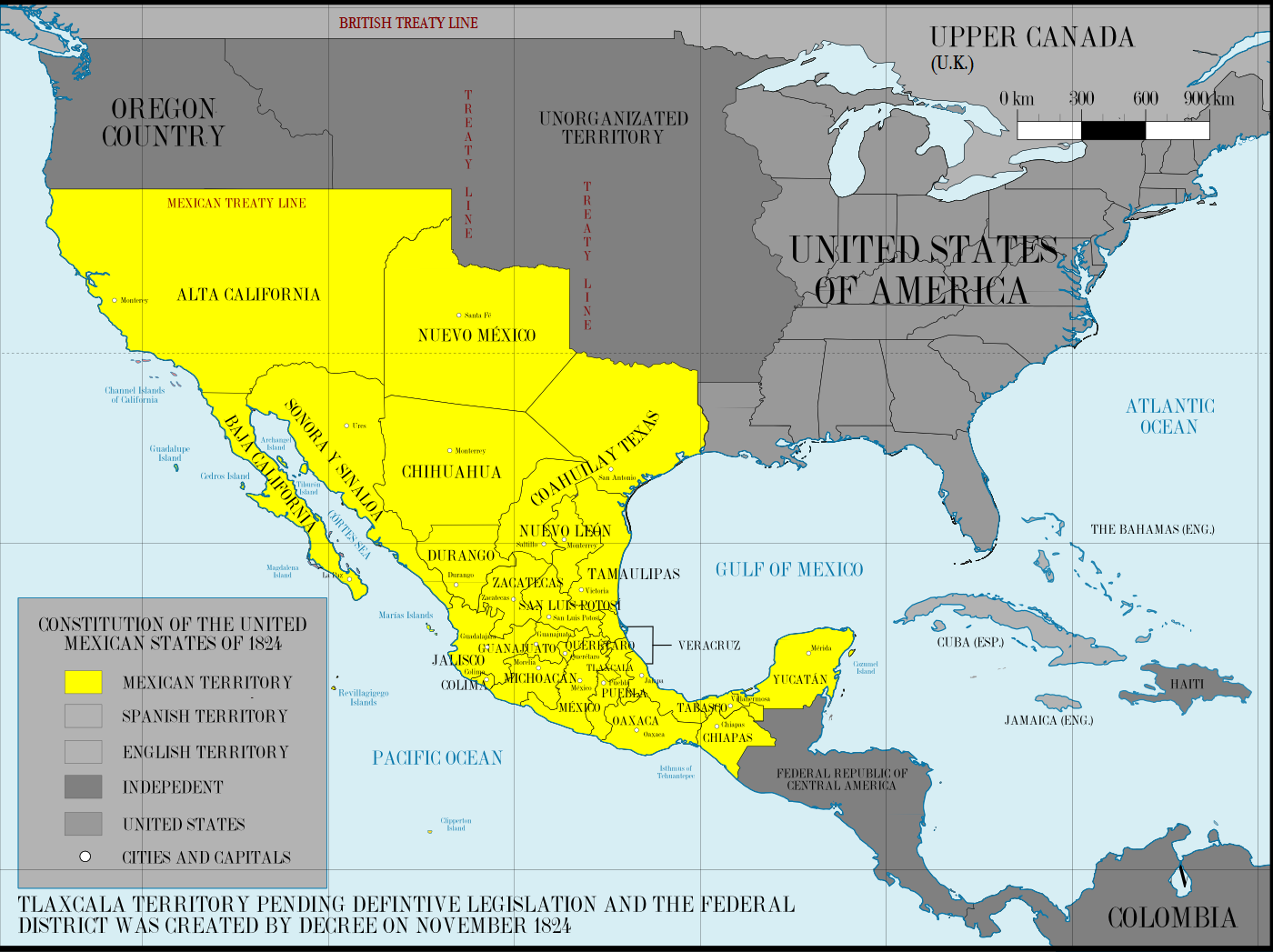
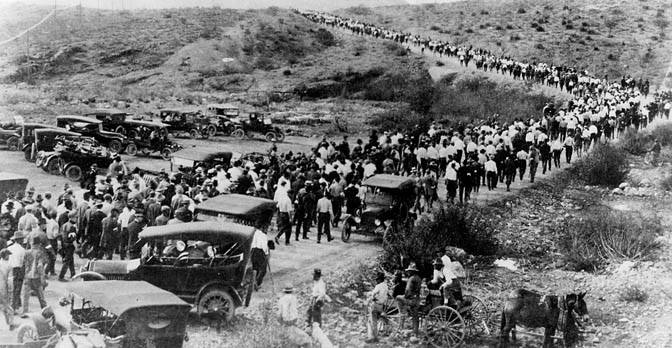
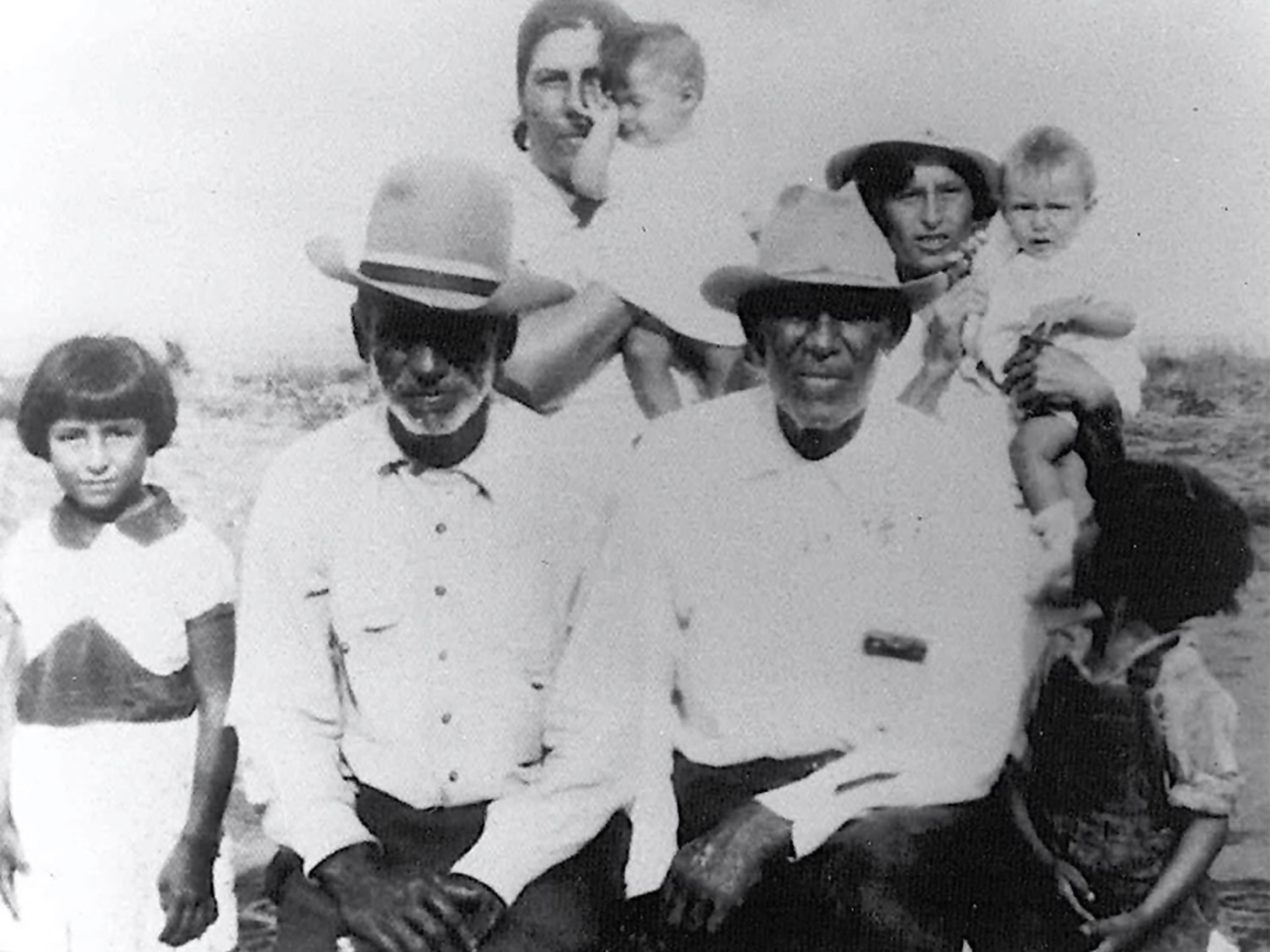






“The law will never make men free;
It is the men who have got to make the law free.”
Henry David Thoreau – July 4, 1856
Framingham, Massachusetts
“On the Duty of Civil Disobedience”
(We as Freemen – Plessy v. Ferguson –
The Fight Against Legal Segregation)
by Keith Weldon Medley P.139.
Andrew Jackson’s “Children of the Forest” The “tea party” went well. The follow up, “We Take Nothing by Conquest,” was the source of a class discussion. Students were animated, opinionated and active in ways they have not been before. —Tyler Tomashek, high school social studies teacher, Westmont, NJ
This lesson was able to take what could have been boring and dry material and made it personal for the students. They were able to have a human connection that they would not have felt otherwise. —Daniel Morgan, high school social studies teacher, Louisville, KY
The impact of the lesson is extraordinary because it helps students begin to see how complicated one event can be and how multiple perspectives serve to help us see the truth behind a seemingly simple series of events.
…
this serves to get them talking about the value of opinions different from their own and open a dialogue about respect and conflict. This lesson becomes directly relevant to their lives and we can apply the lessons of the Mexican American War to our community and use it to repair our modern world. —Kara Redding, high school social studies teacher
This lesson was a valuable, eye-opening experience for me and my students. Our textbook actually dedicates 2-3 pages to the Mexican-American War, but really just focuses on the causes of the war being a misunderstanding. I really liked how this activity provides many different perspectives on this war that the textbook does not.
I’ve typically used this activity near the beginning of the year and I’ve found that since I’ve been using it my students will start to question other stories of events that we study throughout the year. It is a great activity to set the tone for the students to think beyond our regular textbooks and opens their eyes to multiple perspectives, not only for the U.S-Mexican War and “Manifest Destiny,” but for all of our units of study during the year. —Charlie Carr, middle school social studies teacher, Plymouth, MN
The lesson on the Mexican American War and the role play I believe was incredibly effective in helping students understand the role of racial bias in the history of US Foreign Policy. Students really appreciated the opportunity to read and reflect on Zinn’s chapter and then to also appreciate different points of view about the war during the role play. My Latino students appreciated the approach which all too often in their education has not received the treatment it deserves. —Edward Zupcic, high school social studies teacher, Portland, OR
Ulysses S. Grant said the Mexican War was an unjust war. He fought there.
true…sorta kinda but did you also teach that virtually every country on earth was established by conquest…most several times over.
Great Resource! It gave my kids a good insight into the war and they used their Spanish speaking skills very well.
I highly recommend the book : “The Irish soldiers of Mexico by Michael Hogan. The book
is the most definitive work on the Irish involvement in the US war against Mexico, well-
documented with sources from the Mexican Army archives as well as the U.S. Army
archives.
More information about the book is available on
FaceBook: https://www.facebook.com/IrishMex
The book is available on Amazon on Kindle and in paperback in both English and Spanish
and provides maps, photos and over 400 bibliographical sources.
You need to list THE IRISH SOLDIERS OF MEXICO as a source. It is the only history that uses both Mexican and Irish documents to relate the story of the San Patricios Battalion. The San Patricio CD that you list above was inspired by this history.
I agree. We need to dispel the myths and lies of American history. We need to find an alternative heroes in history and not glamorize supposed legends.
We learn that by stealing, killing, and destroying cultures we make and build on top of the old. This teaches children that killing, robbing and destroying is ok, a way of life.
UNTIL IT HAPPENS TO US !!!